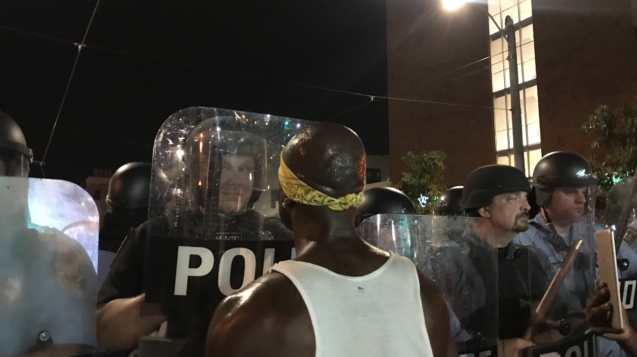Cupid and the cubicle: More colleagues become couples as companies relax dating policies
Originally published in The Kansas City Star Thursday, November 10, 2005, FYI section, Page E1
You’ve seen her around. She goes to happy hour with your buddies, she stops by your desk to say hello.
She’s cute, definitely cute. You think maybe it’s time to bite the bullet and ask her out, but something is looming over your head. You work together. Not in the same department but close enough for the office gossip machine to start rolling if you’re seen kissing in the break room.
Go for it. Ask her out.
Ideas on dating within the workplace are shifting as offices get more casual and a more relaxed generation enters the workforce. Co-workers have always socialized, of course, but romance is no longer against many policies.
“We went through a period in employment regulations when everyone was advised to include in their employee (handbooks that) dating in the workplace was prohibited,” said Suzanne Layton, president-elect of Human Resources Management Association of Greater Kansas City. “I’m seeing less of that today; perhaps there were less bad situations than they expected.”
Derek Smith, 24, works at Cerner Corp., a large health-care software company in Kansas City that employs many recent college graduates. He said seeing co-workers pair off is common.
“What’s the most common way you meet someone? A friend of a friend,” Smith said. “If all your friends work at Cerner, doesn’t that feed into the cycle?”
Lindsey Henry Moss, a spokeswoman for Cerner, said the company has no specific dating policies. However, supervisors are not allowed to manage significant others or people they are dating, she said, and employees are expected to remain professional.
A spot check around the area found similar things: Many places of employment don’t have strict guidelines on dating. Platte County government and the YMCA of Greater Kansas City, for example, don’t have policies against co-workers dating.
And at The Star, there are no written policies against dating. Managers are trained to avoid conflicts of interest, and employees go through sexual harassment training.
If in doubt about your workplace policies, check your employee handbook – or ask.
It’s not only Kansas City singles who are saying dating in the workplace has changed. Local and national surveys agree.
As part of a poll commissioned by The Star, Market Data Specialists asked 600 single people in the five-county Kansas City area where they meet people to date. Work tied for second (with bars) as the place where Kansas City singles find their dating partners. The No. 1 way Kansas City singles meet people is through friends, according to the poll.
Nationally, more people are dating within the workplace, according to a survey by Vault Inc., a career information Web site (www.vault.com). In a 2005 survey, 58 percent of employees said they have had an office romance, up from 46 percent in 2003. In the survey, 59 percent also said that if they were a manager, they would do nothing about office romances unless work quality were compromised.
Megan Lewis, 26, said that when she worked at State Street, a financial service provider in Kansas City, many young people dated their co-workers. She thinks it was a result of how career-driven young singles can be.
“They’re working long hours and not meeting anybody else,” she said.
Research from Careerbuilder .com supports her theory. In a survey of more than 1,300 workers, Careerbuilder found that 22 percent of people who have dated at work began dating after working on a project together and 15 percent began dating after working late. Socialization was a factor as well: Thirteen percent of workers said they began dating after happy hour with co-workers.
Adam Laskey, 26, didn’t realize that helping his friend with a new crop of Cerner trainees would lead to marriage. But it was there he met his future wife, Leslie, 26. They became fast friends and were soon a couple. When he began a project in Fort Lauderdale, she followed. They’ve been married a little more than a year.
Leslie said nothing was awkward while the Laskeys, who both still work at Cerner in Kansas City, were getting to know each other. It doesn’t bother Leslie that they work together because they work in different departments. In fact, she said she likes talking about work at home.
“It allows me to know a different side of the company,” she said.
Is this sort of bliss possible for everyone? Who knows. But the rise of dating in the workplace is a big part of the 20-something generation.
Abby Wilner is the author of Quarterlife Crisis: The Unique Challenges of Life in Your Twenties, published in 2001. The book was instrumental in focusing attention on the “quarterlife crisis,” the period of self-doubt and insecurity many face in their 20s. She also co-wrote a new book published this year, The Quarterlifer’s Companion, which gives tips about how to survive the quarterlife crisis.
Young singles are working more, but they’re also changing jobs more often. The awkwardness that previously came with dating your co-worker isn’t there anymore, she said.
“There’s so much job-hopping now that if it does become a sticky situation, someone can move on,” she said.
Not everyone is so casual about dating in the workplace. Small offices are different, said Steve Vockrodt, 23. He’s a reporter for the Dispatch Tribune in Gladstone, and his office is small, making interoffice dating impossible. But trying to meet someone is equally impossible because so many girls are into dating men from their workplace, he said.
“I think the KC dating scene is very cliquish, and I think one of the cliques that form is people at their jobs,” he said.
That makes sense – young workers have left the easy social scene of high school or college and entered the “real world.”
“You leave school where you are surrounded by people like you,” Wilner said. “The social life comes to you. It’s like a social fantasy land, and all of a sudden you’re on your own in the real world.”
Wilner said it’s important to build social ties outside work, even though it’s hard. She sees dating in the workplace as a last resort – the consequences of a failed romance can be a hazard to your career.
Layton agrees.
“I think it could create a potential harassment situation if the relationship doesn’t work out well,” she said.
Ultimately, Wilner said, the best advice is to proceed with caution when considering romance with a co-worker.
“Get to know someone really well, and make sure you’re compatible before going into something,” Wilner said. “No flings.”



